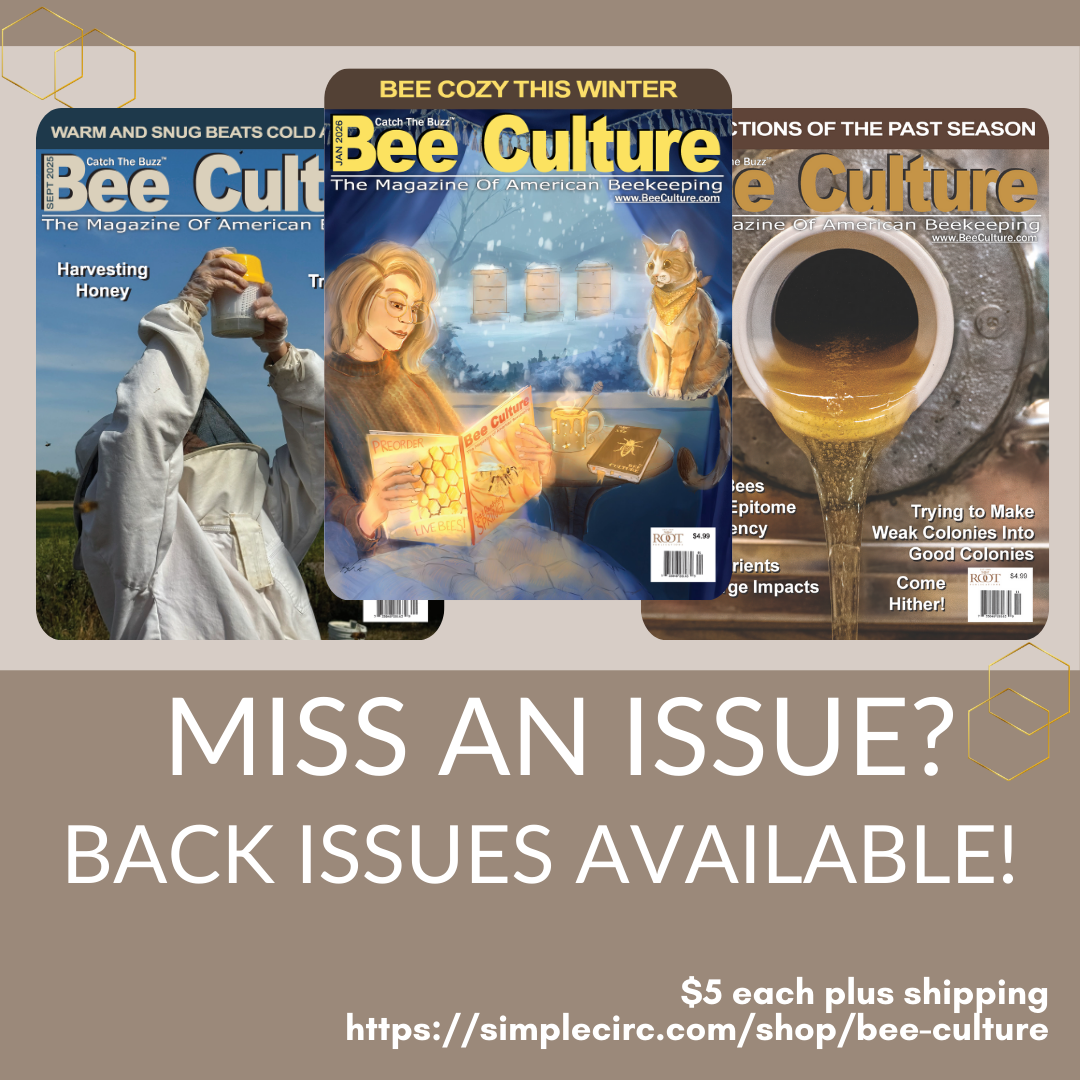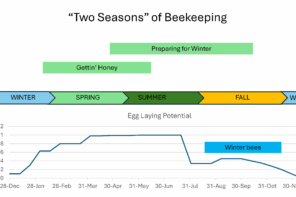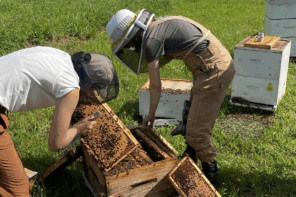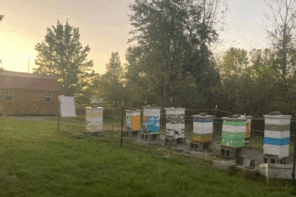Click Here if you listened. We’re trying to gauge interest so only one question is required; however, there is a spot for feedback!
Read along below!
The Best Tasting Honey in the World

By: Ross Conrad
Here’s a subjective headline for you. For most beekeepers, the best tasting honey in the world is the honey they harvest from their own hives. All the planning, worry, sweat, stings and sore muscles that go into every jar accentuates the taste of one’s own honey. But how well does the taste of that honey stand up to others when judged by a group of people who know nothing about you or your honey and have to evaluate your honey solely by taste? That’s a question the Center for Honey Bee Research can help you answer. The non-profit organization located in Asheville, North Carolina is the host of their annual black jar international honey contest.
For those of you not familiar with the term, a black jar contest is a honey contest that is supposed to be judged solely on the taste of the honey. I say “supposed to be” because I entered a black jar contest once down in Florida and my honey was disqualified because it was raw honey that had crystallized. Clearly not all black jar contests are judged solely by taste, but there is one honey contest that really is judged only on taste, and that is the one held by the Center for Honey Bee Research. I had a chance to speak with the winners of the Center for Honey Bee Research’s 2022 black jar contest, Genevieve and Richard (Rick) Drutchas of Worcester, Vermont.

This year’s trophy for the best tasting honey in the world goes to Richard and Genevieve Drutchas.
After serving as the first full-time bee inspector for the state of Vermont, Rick Drutchas developed a small commercial beekeeping business that lasted about 20 years. In 2010, he sold most of his beekeeping business but kept his favorite apiary spots and now, at age 72, works to keep about 100 colonies.
I asked Rick why he decided to enter the Center for Honey Bee Research black jar contest. “The honey contests at honey shows go on about how clear it is, or if there’s a little foam at the top, or if there’s a nick in the lid of the jar: all kinds of silly stuff. This is a contest where they’re just going for flavor and that felt good.” As Rick explains entering the contest was kind of an afterthought. “We had heard about the contest but then forgot about it. Then as the deadline was coming up, we just grabbed some honey out of a five gallon bucket from our home yard, threw it into some plastic quarts and sent it off.”
According to Genevieve Drutchas, the honey that netted them the grand prize was not their typical Vermont honey. “We took a late Fall crop from our home yard last year and it was really interesting – kind of a buckwheat, japanese knotweed, goldenrod mix. We had a field that Rick had put buckwheat in that the bees really loved and the river along our place was just loaded with knotweed as so many places are now, so it was pretty clear where the honey came from in such a short time frame and it was definitely a beautiful and interesting flavor spectrum… I love the japanese knotweed flavor. To me, it’s sort of reminiscent of an elder-flower syrup but this honey had a couple of different flavors, and when I say that what I mean is you would have like a seven second experience. There was a first hit, then a second hit and then there was the aftertaste. There were a lot of different flavors in there… and it definitely had that nice silky cream that you sometimes get in the later Fall honeys—a fine crystal and very creamy. You know how a goldenrod can be almost silky like lingerie when it crystallizes? It had that kind of consistency.”
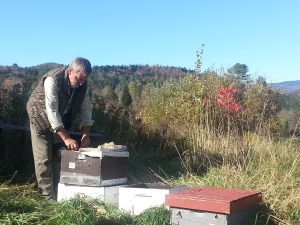
Rick Drutchas checking on some of his nucleus colonies.
After speaking with Rick and Genevieve, I managed to catch up with the Executive Director of the Center for Honey Bee Research in Asheville, Carl Chesick, to ask him about the contest and the judging process that evaluates over 600 entries from across the globe. “It varies from year to year. We never know exactly who’s going to enter. We’ve had 42 different countries around the world that have been competing in various years. Our categories are not fixed because we base it on what entries we get. We take a look at all the entries and figure out what categories will give the fairest chance to everybody… we have 10 categories and the category winners get $150, a custom ribbon with their name printed on it, a certificate and bragging rights. (The grand prize winner got $5,500 – RC) We have a lot of preliminary rounds, always with at least five judges. They don’t know anything about where the honey’s from. The highest scoring go on to subsequent rounds until we get down to the 30 finalists. While the judges don’t know, I know what the categories are because I get all the entries from around the world, so a lot of times they’re geographical, like we had Europe, Africa, the Far East, that kind of thing. We also had a category that Genevieve and Richard won in, creamed honey. Years ago we didn’t have a creamed honey category because here locally, people think anything that is solid is honey that has gone bad. So we’ve been doing an educational thing since then and what we realize is people really like creamed honey, provided that the particles are fine enough, and sometimes it’s accidental and sometimes they really work hard to get that. So if we get an entry that’s already crystallized, I look at it and take a little taste and see if it’s got fine particles or not. If it’s fine enough then it will go as a creamed honey.
“Now the judges don’t get to see the honey, but when you’ve got creamed honey you can’t put it up against liquid honey and expect that it’s going to even out apples-to-apples. We get a lot of honey’s that are really dark and are strongly flavored honeys so we usually put those in the preliminary rounds where they’re against each other so they get an apples-to-apples judgment. It is only in the finals where there’s going to be dark honeys against water white honeys.
“Mono-floral is a category usually. A couple years ago, since we have sourwood down here, we had like 110 entries that specified they were sourwood. So, they had to go together and that was a really competitive category that year… If the honey has a uniqueness like a dark honey, or a creamed honey, or a mono-floral honey where they’ve stated it’s from a particular source then those are all going to be categories, but the rest of them, if one’s from Holland and one’s from Wisconsin, I feel like they should go in different categories and it’s subjective. It’s the board looking at the entries and trying to decide what’s the fairest way to break them up.”
The judges don’t know what the categories are and solely judge each honey on its taste. Once their ratings have determined the top three entries in each of the 10 categories, they go on to the finals. Once a winner in each category is determined, the 10 category winners go up against each other for the grand prize.
According to Chesick, “We don’t let the judges talk to each other about the honey because the first year or two they did, and they were like ‘ooh that’s good’ or ‘that one’s got whatever’ and the alpha people would influence all the rest of the judges and the scores were all the same. So we said right, you can’t make faces and you can talk to each other about anything you want in between the tastings but you can’t talk about the honey.”
I asked Genevieve what advice she would offer to those who might want to enter next year’s 12th annual black jar international honey contest. “What the judges seem to be going for is the interesting raw flavor spectrum and we’re in that moment right now with nectar sources changing as they are with the climate crisis weather and invasive species. The winners have been all over the place from classic Italian rural honeys to unusual varieties that a beekeeper in New Zealand who’s not a manuka maker, he’s making another unusual smaller nectar sourced honey and he’s won twice. I think what they’re looking for is interesting honey that still fits that classic spectrum of yum, a crazy delicious honey kind-of deal but they work pretty hard to have different people in all the realms of tasting so a whole lot of people are giving you feedback on your honey when you enter the contest and that alone is a valuable thing.”
She went on to reflect: “At this point in Rick’s beekeeping life this (recognition) was really meaningful. With all the changes in beekeeping and just choosing this life-style in Vermont, it was really meaningful in a sweet way to win something like this.”
Next year’s black jar contest is expected to feature a grand prize of $6,000. The festival event where the category finalists will square-off against each other is scheduled for June 4, 2023 at Salvage Station in Asheville, N.C.
Note: The interview quotes in this article were lightly edited for clarity and length.
Ross Conrad is author of Natural Beekeeping and co-author of the Land of Milk and Honey: A history of beekeeping in Vermont

